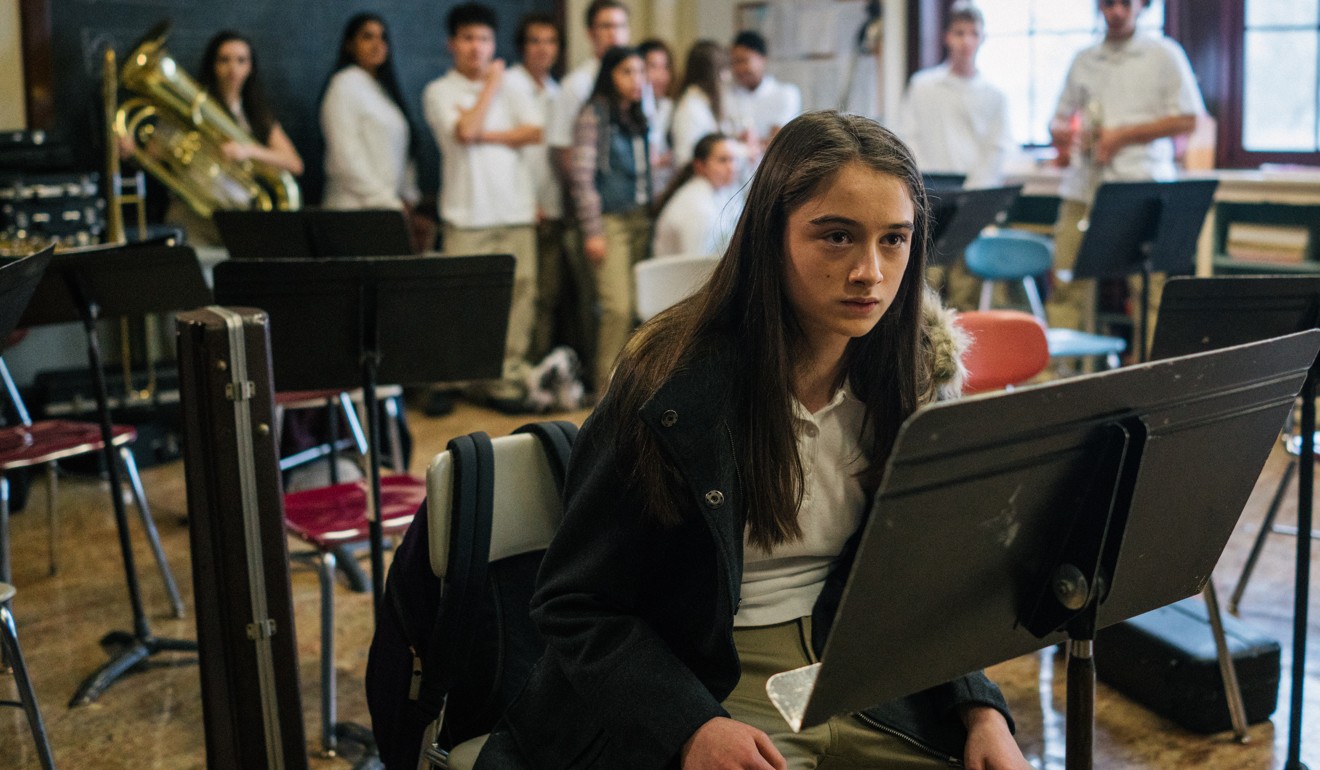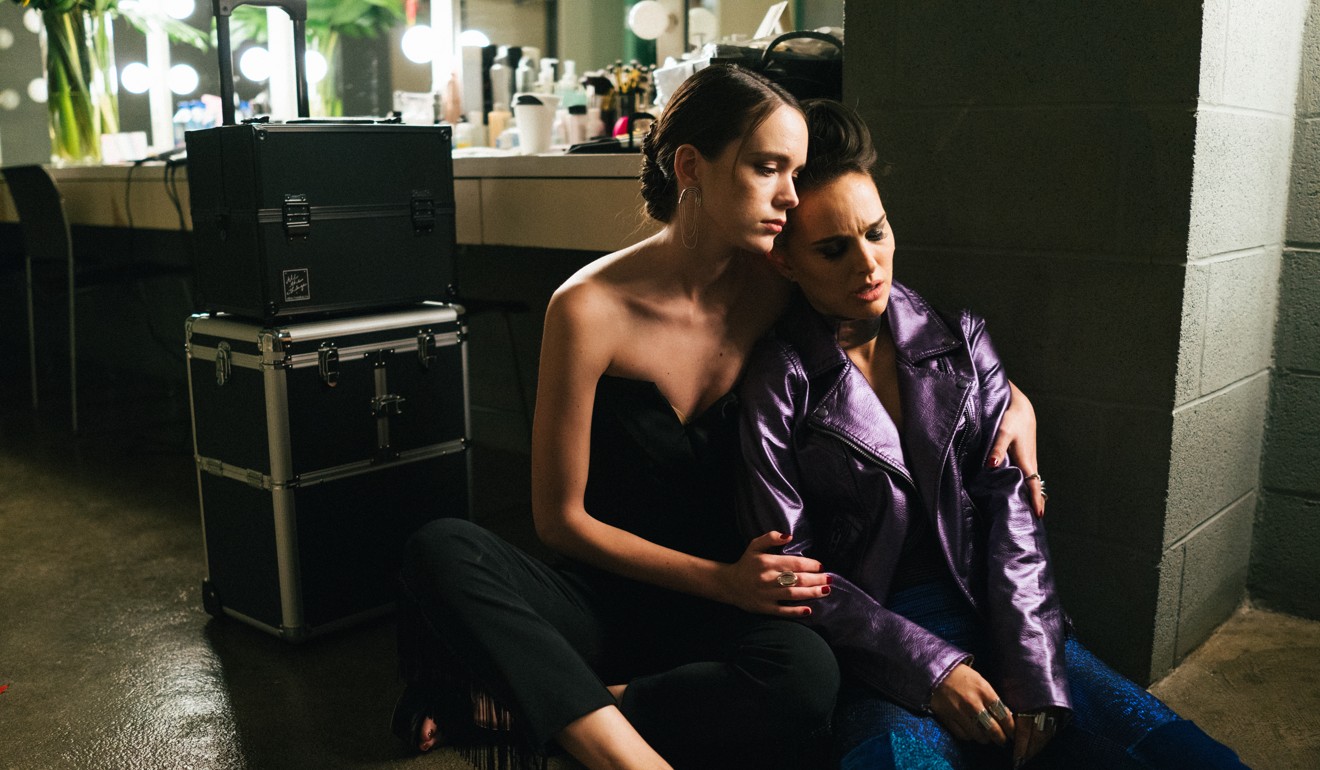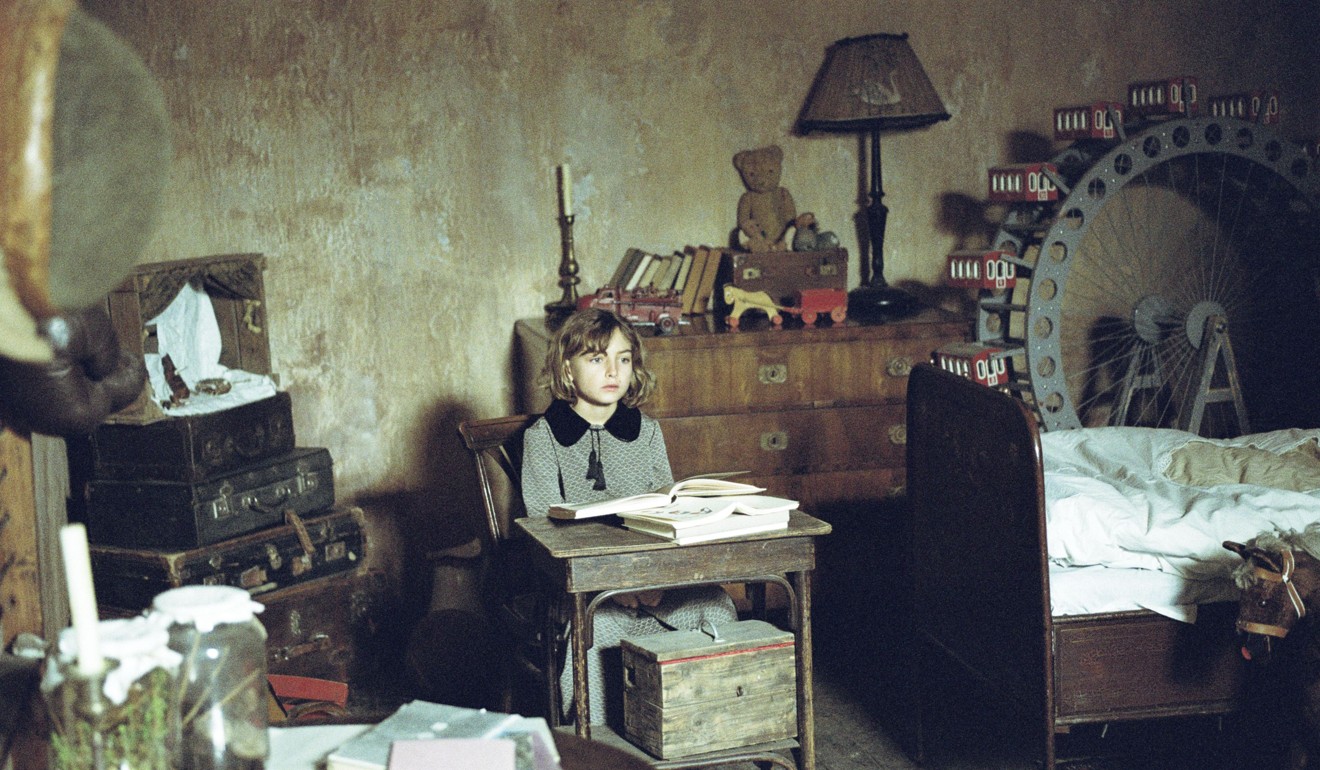
Vox Lux: why Natalie Portman turned into a pop star for dark tale of celebrity and mass shootings
- Portman plays a girl who is injured in a shooting and records a tribute to the victims that makes her a star
- The cast and director talk about Sia, celebrity, violence and the media
Anybody who saw Brady Corbet’s directing debut The Childhood of a Leader will know he’s an actor-turned-filmmaker with a singular voice. While that was an operatic study of 20th century totalitarianism, his follow-up Vox Lux is a contemporary tale set at the crossroads of tragedy and fame.
A thematic continuation, “this movie dips into a different kind of brashness and vulgarity,” he says, “simply because we’re living in fairly brash and vulgar times.”
Beginning in 1999, young pupil Celeste ( The Killing of a Sacred Deer ’s Raffey Cassidy) is injured in a high-school shooting. After recovering, and with the help of her older sister Eleanor (Stacy Martin), she records a track dedicated to the victims, a tune that unexpectedly turns her into a star.
Naturally, given the sequence takes place in the same year as the infamous massacre at Colorado’s Columbine High School, Corbet knew he’d face objections. “I’m a parent and I knew I was never going to handle it in a gross way; I was going to handle it in an ethical way,” he says, typically self-assured.
“So it was on my mind. But every time somebody acted a little offended by it, I just wasn’t having it. I just didn’t buy it. I felt like it was a fake empathy and it drives me a little nuts. The characters are fictional, the shooting is fictional … because we didn’t want to explore a specific tragedy.”
Post-Columbine, America has increasingly endured such shootings – Virginia Tech, Sandy Hook Elementary School and the attacks in Parkland, Florida, to name but three. Corbet calls it nothing short of “an international humanitarian crisis” and one that merits discussion.
Avengers: Endgame directors on their Marvel Cinematic Universe journey
“The idea that a painting or a film or a piece of music or some prose on the theme would or should be off-limits is absurd to me,” says the director.
Still, Vox Lux is not a film about the hot-button issue of American gun control; rather, it’s a character study of a woman whose life and career becomes defined by tragedy. Fast-forwarding to 2017, we rejoin Celeste (played by Natalie Portman) on the eve of the release of her new album, Vox Lux.
Now a tantrum throwing diva, she’s endured it all: addiction, rehab and a fractured relationship with her daughter Albertine (Cassidy, again, in a clever casting twist). Then word filters through that in Croatia, there’s been another mass shooting – with the gunmen wearing masks copied from one of Celeste’s music videos.

Again, Corbet is keen not to draw comparisons to real-life events, although it’s hard not to think of Celeste enduring some sort of Brittany Spears-like meltdown or the horrific suicide bomber attack at the Ariana Grande concert in 2017 in Manchester, England, that caused 23 fatalities.
For the 30 year-old Corbet, it was a chance to look at the way we process tragedy in contemporary society and – crucially – the way we’ve become desensitised to it. “When we look at today’s headlines, we can either read about yesterday’s mass shooting or we can read about one of the Kardashians getting engaged.
It was so beautifully written and complicated and, of course, the chance to play a pop star was a dream
“You can choose your own adventure every day on your telephone. The way these things have somehow become equivalent – even though one is a pressing matter and the other is not at all whatsoever – was what the movie was supposed to be addressing.”
For Portman, despite shooting her scenes in just 10 days, it was arguably her most demanding role since her Oscar-winning turn as a ballerina enduring a psychological breakdown in Darren Aronofsky’s Black Swan.

“It was so beautifully written and complicated and, of course, the chance to play a pop star was a dream,” she says. It was also the chance to work with her husband, Benjamin Millepied, who choreographed the film’s finale – an uproarious, glitter-filled concert.
Corbet knew he needed “a big, splashy, iconic actor” to play Celeste as an adult. “I also wanted somebody who was really f***ing committed! It’s really a do-or-die, totally-go-for-broke performance.”
Initially unable to commit due to being pregnant, Portman signed on when the film moved its start date. “She’s an amazing, relentless woman,” remarks her co-star Stacy Martin. “She asks the right questions and she answers the right questions as well.”
Providing the songs for Celeste to sing was Sia, the Australian singer-songwriter who has penned hits for Beyoncé and Rihanna. “I’d been a fan of Sia’s for a long time,” says Portman.

“Of course, I’m not playing her. But to get to sing her music was a great luxury. I didn’t meet her for this film but I had met her before at various events and she’s always been very lovely and has a real passion for dance. She’s unbelievably talented … I’m in awe of her.”
Choosing Sia was simple, says Corbet. “Basically we needed a pop star that wrote their own music and there’s almost nobody that does. Sia’s one of the great exceptions to that rule.
“Not only does she write her own music but she writes so much music for other people. I thought that because [of this] her presence would disappear and the character could have ownership of these songs.” The film, he adds, “couldn’t exist without her participation”.
It’s testament to Corbet’s talent that he was able to call on the likes of Sia and Natalie Portman, as well as Jude Law (as Celeste’s slimy manager) and Willem Dafoe (as the film’s narrator).

For the soundtrack, he also reunited with musician Scott Walker – who worked on The Childhood of a Leader – on what proved to be his last major project before he died in March. Corbet pays tribute to the way Walker would gee him along. “I need people to help support me with these movies.”
Working on a low budget, Corbet was forced to shoot the film in just 22 days. “It was very tight. We didn’t have money,” says Martin, who worked with him first on The Childhood of a Leader. “But Brady manages to take any kind of conflict and sacrifice and turn it into something creative. That’s what I really like about working with him … there’s always a way. He will fight to the end.”
Adds Portman, “Brady created a very free, creative environment.”
10 must-see summer blockbusters after you’ve seen Avengers: Endgame
It’s this artistic daring that powers his work. Corbet has already written his third film, this time with off-screen partner Mona Fastvold, who also co-wrote The Childhood of a Leader. Called The Brutalist, it deals with a mid-century modernist architect.
“We really thought this was quite a departure from anything that we had made,” he chuckles. “And now everyone who read it says, ‘Oh it’s like your other movies!’” When you’re an auteur like Corbet, that’s no bad thing.

 (1).JPG?itok=0BHk6odg&v=1665981271)